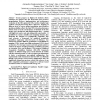Free Online Productivity Tools
i2Speak
i2Symbol
i2OCR
iTex2Img
iWeb2Print
iWeb2Shot
i2Type
iPdf2Split
iPdf2Merge
i2Bopomofo
i2Arabic
i2Style
i2Image
i2PDF
iLatex2Rtf
Sci2ools
167
click to vote
FCCM
2011
IEEE
2011
IEEE
Multilevel Granularity Parallelism Synthesis on FPGAs
— Recent progress in High-Level Synthesis (HLS) es has helped raise the abstraction level of FPGA programming. However implementation and performance evaluation of the HLS-generated RTL, involves lengthy logic synthesis and physical design flows. Moreover, mapping of different levels of coarse grained parallelism onto hardware spatial parallelism affects the final FPGA-based performance both in terms of cycles and frequency. Evaluation of the rich design space through the full implementation flow - starting with high level source code and ending with routed netlist - is prohibitive in various scientific and computing domains, thus hindering the adoption of reconfigurable computing. This work presents a framework for multilevel granularity parallelism exploration with HLS-order of efficiency. Our framework considers different granularities of parallelism for mapping CUDA kernels onto high performance FPGA-based accelerators. We leverage resource and clock period models to estimate the...
Design Space | FCCM 2011 | Granularity Parallelism Exploration | Multilevel Granularity Parallelism | VLSI |
| Added | 20 Aug 2011 |
| Updated | 20 Aug 2011 |
| Type | Journal |
| Year | 2011 |
| Where | FCCM |
| Authors | Alexandros Papakonstantinou, Yun Liang, John A. Stratton, Karthik Gururaj, Deming Chen, Wen-mei W. Hwu, Jason Cong |
Comments (0)

